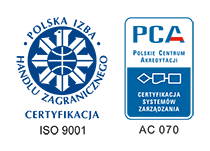LAMP (Loop-mediated isothermal amplification) is a technique for a quick amplification of nucleic acids. In contrast to the PCR technique, in which the reaction is carried out with a series of alternating temperature cycles, the LAMP reaction is carried out in a constant temperature of 65°C. This technique uses Opti Bst polymerase which has strand displacement activity. The reaction is exceptionally quick and efficient thanks to using a set of three pairs of primers specific for template DNA. In the first phase, a base product with loop formation at the ends is created, next the strand displacement activity and attachment of subsequent primers lead to the creation of increasingly longer DNA fragments consisting of the base product repeats. In the electrophoretic separation the obtained product is not a single band but constitutes a mixture of products of various sizes with repeated sequence. The detection is done via the reaction colour change. As a result of DNA amplification, the reaction solution changes colour from clear (no amplification) to blue (DNA amplification). Very large amounts of created product cause turbidity of the sample. Blue-LAMP UNG KIT contains dUTP and Thermolabile UNG, which prevents amplification of previous reaction products that contain uracil. These additions reduce the possibility of carryover contamination (where the product of a previous reaction can unexpectedly serve as the substrate of a subsequent reaction).

